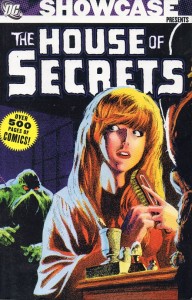Comic Book Review: Showcase Presents The House of Secrets Volume One edited by Joe Orlando
House of Secrets started its publication history in 1956 as a “weird menace” title. You couldn’t really do horror comics as such under the Comics Code, but short tales tinged with the supernatural where evil was punished and good rewarded? Sure. It also had a number of psuedo-superhero types, like Mark Merlin, Prince Ra-Man and Eclipso. The last of these, (“Hero and Villain in one man!” went on to be a player in the DC universe, and has his own Showcase volume. The Silver Age run ended with #80 in 1966.
After a three year hiatus, it came back as The House of Secrets. The Comics Code had eased up some, and it was possible to do horror comics in the mainstream again. #81 started by introducing an actual House of Secrets, which seemed to be both intelligent and malevolent, killing its then-owner in the first story of the issue. A new caretaker was hired, the pudgy and rather cowardly Abel, who loved to tell scary stories. (His nastier brother Cain did the same over at the House of Mystery.)
Each issue, Abel would introduce a few short tales of horror, often having a small adventure of his own in between. The quality of the stories varied widely from trite to quite good. A particularly well-received story was “Swamp Thing” in #92. It was so liked that the main character was slightly updated and given his own series, which went on to become famous. Another standout is “The Ballad of Little Joe” in #86, about a puppet that comes to life. What makes that story special is that one of the “villains” is clearly a philosopher at heart, rather than the conqueror his culture wants him to be. “You can twist form–but can you ever change a man’s love?”
Then there’s “There are Two of Me…and One Must Die!” in #91, which puts a new twist on the stock DC plot of spotting the fake person by a tiny clue. I do have to say that reading a bunch of these stories in a row can make them a bit samey, and they’re mostly quite tame by today’s horror standards.
The art ranges from workmanlike to excellent–the lack of color does not hurt most of the stories, and in some cases enhances the feel. (The four-color process sometimes detracted from the mood of stories.)
I would recommend this volume to DC fans of a certain age, and those looking for horror stories that are spooky, but not too horrific. I’ll leave you with one of the epilogues…
“Silence sounds like green vines creeping…dry boards scream like blind men seeking…for these are the signs…of secrets lurking…”

